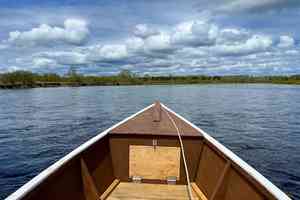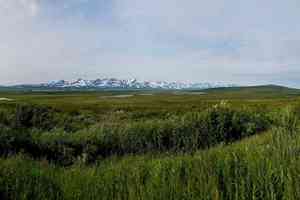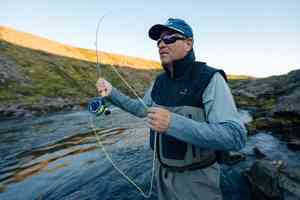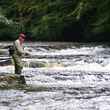What costs taxpayers absolutely nothing, has funded over 41,000 conservation and lands projects at the federal, state and local levels, has protected over 2.3 million acres of forests and—throughout most of its 54 year history—has enjoyed bi-partisan support from lawmakers? It's a question that many might not be able to answer because, despite its positive impacts in nearly every county in the United States, the nation's most important program for the preservation and protection of public lands—the Land and Water Conservation Fund (LCWF)—has historically spent little time in the spotlight. In spite of that far reach and long history of overwhelming success, the LWCF is facing expiration for the second time in 3 years, thanks to the efforts of lawmakers on the fringes of public opinion who have worked diligently to see the LWCF defunded or eliminated.
Perhaps the greatest testament to the LWCF's success is the staggering variety of projects which it has funded. The LWCF's reach isn't limited to preservation of hiking trails or vast gamelands in the west, protection of iconic landscapes and construction of roads our national parks, creation of easements and protection of wildlife corridors that preserve fish and game habitat or acquisition of land to protect access to hunting and fishing opportunities throughout the U.S. While the LWCF has funded all of those things, it has also funded thousands of humbler projects that reach into virtually all walks of American life—such as city parks, ballfields, urban recreation centers and more.
It bears repeating that the LWCF costs taxpayers nothing. Literally. Today the LWCF is funded almost entirely from fees generated by offshore oil and gas drilling. Oil and gas companies extract these publicly owned resources and share a portion of their profits with the American people. This reality, the LWCF's complete lack of expense for taxpayers, is one of the keystones of its long-running popularity.
Perhaps even more importantly, the LWCF isn't just cost-neutral. It's a sound investment. According to a 2017 U.S. Department of the Interior report, every $1 of offshore oil and gas money invested in the LWCF returns $4 in economic value for local communities
But, in 2015, thanks primarily to congressional sabotage by familiar faces in the far-right political movement to privatize America's public lands—Rep. Rob Bishop and Sen. Mike Lee—the LWCF was allowed to expire, leaving countless LWCF-funded programs flapping in the wind. Only after several months of political blowback did congressional opponents yield, putting through a temporary reauthorization of the LWCF in December of that year. The temporary lifespan for LWCF was 3 years. Now in 2018, with the LWCF set to expire in less than two months, congress once again seems willing to let the beloved program die.

One Republican senator, however, is flouting his party's overwhelming consensus—only 13% of Republican senators support the LWCF, while 91% of Democrats and both independent senators back the program—and is leading the charge to see the LWCF reauthorized, permanently this time. As E&E news has reported, Sen. Richard Burr of North Carolina has gone to the Senate floor multiple times to propose measures to reauthorize the LWCF. Burr has insisted he wil find a way to see the LWCF permanently extended, declaring his willingness to "come down here and do this morning and afternoon, day after day after day."
"In 2015, it took the expiration of the Land and Water Conservation Fund before Congress got serious about reauthorizing the program and allowing these vital conservation efforts to continue," Burr said.
Burr has even introduced versions of his proposal that would specifically allocate a portion of LWCF funds to the National Parks' maintenance backlog, a frequently cited boogeyman of Republicans who have long failed to support the LWCF in any form.
"I'm giving you a great opportunity. I think I have addressed in the last 24 hours every concern that has been expressed—budget, taxpayer money, parks and maintenance, why should we do it," Burr told other members of congress.
But despite Burr's repeated attempts to see permanent reauthorization and funding of LWCF included in various measures moving through congress, his efforts have been stymied. According to Julia Peebles, Government Relations Manager for Backcountry Hunters & Anglers (BHA), Burr's lack of success is due mostly to the upcoming November mid-terms. With the elections looming, "They don't want to be seen as adding any pork or riders. They want to advance clean bills," Peebles said of votes from senators like Lisa Murkowski (R-Alaska), who have voted to prevent Burr's efforts from moving forward.
Due to the current political climate and pending mid-terms, Peebles can foresee a scenario where the LWCF will once again be allowed to expire, with its future left for lawmakers to decide after the November elections. But, “this outcome is not preordained,” she cautioned. “If our elected officials can rise to the occasion, keep in mind the best interests of our lands, waters and citizens, and—like Sen. Burr has done—take a leadership role in brokering compromise, the LWCF could survive.”
With senators' and representatives' minds focused on the ballot boxes—candidates perceptions of voter reactions can serve as an equally powerful call to vote for preservation of the LWCF as they can a reason to shy away from doing so. In other words, voters sending the message to their elected representatives that they should stand and fight for the LWCF is crucially important.
Part of moving everyday Americans to speak up for little-known programs like the LWCF is education—informing voters on the far reaching impact, many successes and ongoing projects that for which the LWCF is responsible.
“It is one of the most successful programs in the history of our nation,” says BHA. “The projects it has funded have fueled a huge economic engine, creating the kind of communities that Americans want to live in, raise their families in, invest in and protect. But, BHA added, the “LWCF is also one of the least known or understood programs in our nation. The vast majority of citizens who benefit every day from the LWCF have no idea that it exists. Now is the time for Americans to learn about the LWCF, what it is, what it has accomplished, and what is at stake if it taken away from us.”
To that end, BHA has launched a new web site to help Americans learn more about the LWCF. There, readers can learn about the LWCF's history, examine a variety of LWCF success stories, explore important projects that would be canceled or in jeopardy if the LWCF were allowed to expire as well as quickly and easily contact their representatives in congress to urge them to support of the LWCF.

Other groups have recently produced similar resources. The Center for Western Priorities recently released a report entitled Funding America's Conservation Future, which examines completed and in-progress LWCF projects during the years 2014-2017. The Wilderness Society has also continued to update its interactive map which allows American's explore a vast array of LWCF-funded projects and to zoom in on their region to see how LWCF has impacted their communities.
Advocates of the LWCF are urging voters to use these resources to learn more about the LWCF and take action. “In order to avert this pending crisis, members of Congress must unite and take action before the LWCF expires at the end of September,” BHA CEO Land Tawney told Hatch Magazine. “We the people must send a strong and uncompromising message to our elected officials: Stand up for the Land and Water Conservation Fund. Stand up for the best of who we are as a nation.”

































Comments